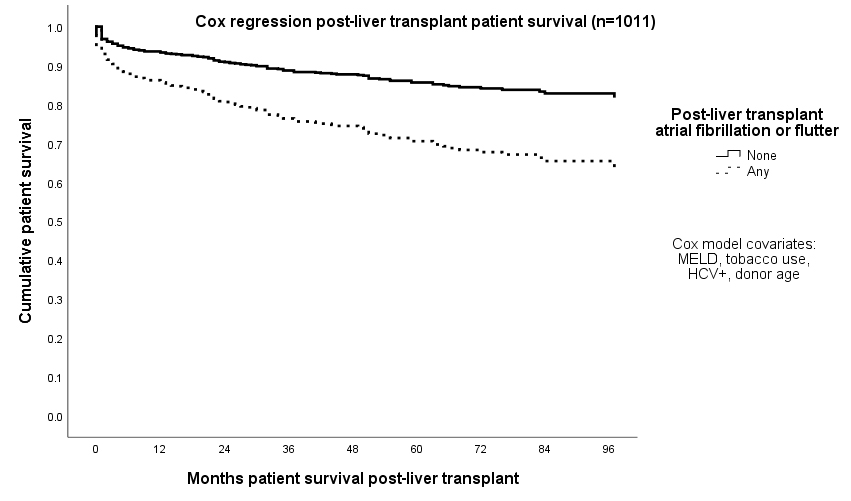Post-Liver Transplant Atrial Fibrillation is Associated with Markedly Reduced Short- and Long-Term Patient Survival
1Medicine, Indiana University School of Medicine, Indianapolis, IN, 2Surgery, Indiana University School of Medicine, Indianapolis, IN, 3Gastroenterology/Hepatology, Indiana University School of Medicine, Indianapolis, IN, 4Cardiology, Indiana University School of Medicine, Indianapolis, IN
Meeting: 2019 American Transplant Congress
Abstract number: 434
Keywords: Angiography, Echocardiography, Liver transplantation, Risk factors
Session Information
Session Name: Concurrent Session: Liver Transplant Complications and Retransplantation II
Session Type: Concurrent Session
Date: Tuesday, June 4, 2019
Session Time: 2:30pm-4:00pm
 Presentation Time: 3:06pm-3:18pm
Presentation Time: 3:06pm-3:18pm
Location: Ballroom A
*Purpose: Postoperative atrial fibrillation (POAF) is the most common perioperative cardiac arrhythmia. Data regarding POAF following liver transplant (LT) is scarce. In the immediate post-LT period, atrial fibrillation is particularly problematic as it can result in elevated central venous pressure and poor graft venous outflow. This study reviews the incidence and risk factors of POAF after LT. Outcomes include in-hospital death, 90-day readmission, and long term survival outcomes.
*Methods: Study involved all LT patients from 2010 to 2018 at a single U.S. LT center. Collected data included demographics, cardiac-specific risk factors, pre- and post-LT invasive and non-invasive diagnostic cardiac studies, as well as hospital readmission and overall mortality. Data collection also included the need for pharmacological and/or electrical cardioversion. Atrial fibrillation and flutter were combined for this analysis. EKG documentation of the arrhythmia was required for diagnosis.
*Results: There were 1011 consecutive LT patients included in this analysis. The median MELD score was 22, age 57, BMI 29, with 67% males and 90% Caucasians. Regarding cardiac risk factors, 30% were diabetic, 36% had history of hypertension, 50% had history of tobacco use, 37% had an immediate family history of coronary artery disease (CAD) and 7% had a documented history of CAD. The incidence of POAF was 10%. Factors associated with POAF included higher MELD (p=0.04), older age (p<0.001), diabetes (p<0.01), and history of CAD (p<0.001). Compared to patients with a normal cardiac stress test (8% POAF), those with abnormalities had increased risk of POAF ranging from 13-25% (p=0.03). Similarly, patients with documented non-obstructive or obstructive CAD had significantly more risk for POAF (13% and 19%, p<0.01). Patients with POAF had a risk of death of 12% during the LT admission, and risk of death at 90 days and 1 year of 12% and 21%, respectively (p<0.001). Cox regression demonstrated an 8-year survival difference of 82% (no-POAF) versus 64% (POAF) (p<0.001).
*Conclusions: These results highlight the importance of POAF as a marker for early and late post-LT death. Patients at highest risk for POAF included those with higher MELD, older age, diabetics and patients with known CAD.
To cite this abstract in AMA style:
Rachwan R, Kutkut I, Hathaway TJ, Timsina LR, Ghabril MS, Lacerda MA, Kubal CA, Bourdillon PD, Mangus RS. Post-Liver Transplant Atrial Fibrillation is Associated with Markedly Reduced Short- and Long-Term Patient Survival [abstract]. Am J Transplant. 2019; 19 (suppl 3). https://atcmeetingabstracts.com/abstract/post-liver-transplant-atrial-fibrillation-is-associated-with-markedly-reduced-short-and-long-term-patient-survival/. Accessed February 27, 2026.« Back to 2019 American Transplant Congress

